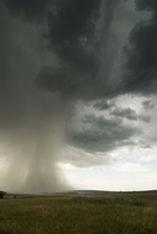
UK growers have united to warn retailers against promoting on price this season as yields across major lines plummet and costs soar following the worst vegetable production conditions in living memory.
Crops have again been lashed by heavy rainfall this week as the wretched 2012 weather continues to hamper production.
James Hallett, chief executive of the British Growers' Association, said: “This has been a growing year that has tested growers' ingenuity, planning and efficiency to the limits. This will come at a cost, not just in yield reductions, but also increased labour and diesel costs.”
Brassicas have been some of the worst affected crops with record rainfall, vastly reduced sunlight and cold temperatures in Lincolnshire, Cornwall and Scotland (the major growing areas) as well as in some of the supporting locations.
Matthew Rawson, chairman of The Brassica Growers' Association, described waterlogged conditions at field capacity, meaning crops developing poor root systems and some areas witnessing plants rotting off from their roots.
He said that plantings were delayed as growers waited for the land to become favourable, which failed to materialise and so crops were entered into poor soil structure resulting in growth that lacked its usual vigour.
"Supply will continue to fluctuate week by week,” said Rawson, “which is where supplier-retail relationships will need to be at their strongest to determine the best course of action in regards to trade planning. Although the weather continues to be a factor, the biggest threat to this industry currently is that of promotional strategy.
"We will ensure that we work closely with our retail partners to create a plan that offers value for consumers but sustainable for the industry as a whole.”
Broccoli yields are still well down on average following a 30 per cent reduction in the first half of the season. Brussels sprouts have generally grown shorter, which usually leads to lower yield and it is the earlier varieties that have been hurt the most. Red and white storage cabbage are smaller than average so a lower tonnage per acre seems likely and late savoy and cauliflower plantings were delayed, meaning continuity could be disrupted. Late swede crops are small and probably down by 20 per cent in yield.
High winds in Scotland and up to 65mm of rainfall in the Borders have hit broccoli growers north of the border this week. Alistair Ewan of East of Scotland Growers said: “We had very heavy rain on Tuesday with trees down and roads closed. However, we are harvesting broccoli and cauliflower as long as it is safe to do so. In all the years I have been growing, this has been one of the most difficult. The summer has completely bypassed us: we have had 2.8 times the average rainfall. Quality is OK, but yields are right down… we certainly don’t want to be chasing dozens of promotions. What we need now is for everyone to be sensible.”
Meanwhile, the onion harvest is expected to fall back significantly on last season’s bumper crop.
John Patrick, chairman of British Onions, said: “The bulb onion harvest for 2012 to date can be summarised as robust yet variable. With a reduced acreage and tough growing conditions, national tonnage could be back from last year’s bumper crop by nearly 100,000 tonnes - Europe could well be back by 500,000 tonnes on its monster crops of 2012.
“With harvest only 50 per cent complete, such predictions could be foolhardy, but in the context of a shorter marketing year, I am hopeful the reduced national crop will still be in balance with our customer needs.”
And while asparagus growers lick their wounds following the 2012 season which saw yields 25 to 50 per cent down around the country, Andy Allen, head of the UK Asparagus Growers' Association, warned: “Many growers have reported lost plants particularly from their older plantations, no doubt due to the waterlogged soils thus there may be lasting damage to some crops.”



